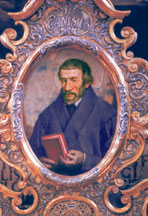By Bert Ghezzi
From Voices of the Saints
If you have too much to do, with God’s help you will find time to do it all.
—Peter Canisius
 For a half-century Jesuit Father Peter Canisius led the Catholic Reformation in Austria, Bavaria, and Bohemia. For that reason he is reckoned an apostle to Germany, second only to St. Boniface. With stupendous energy he preached and taught in parishes, reformed and founded universities, wrote many books including popular catechisms, restored lapsed Catholics, converted Protestants, preached retreats, and found time to care for the sick. In his last thirty years traveling more than twenty thousand miles on foot or horseback, St. Peter Canisius spearheaded the renewal of the Catholic faith in southern Germany.
For a half-century Jesuit Father Peter Canisius led the Catholic Reformation in Austria, Bavaria, and Bohemia. For that reason he is reckoned an apostle to Germany, second only to St. Boniface. With stupendous energy he preached and taught in parishes, reformed and founded universities, wrote many books including popular catechisms, restored lapsed Catholics, converted Protestants, preached retreats, and found time to care for the sick. In his last thirty years traveling more than twenty thousand miles on foot or horseback, St. Peter Canisius spearheaded the renewal of the Catholic faith in southern Germany.
Peter Canisius revitalized Catholic life and teaching at universities in Ingolstadt and Augsburg. He founded new ones at Prague and Fribourg. In all four cities his preaching and catechizing won the hearts of Catholics and attracted nominal Protestants to the church. In Vienna his personal care for plague victims made him a most popular figure. Thus, when appointed diocesan administrator, he was in a position to revive the city’s long decadent Catholic community.
After 1555, Peter Canisius published his famous Summary of Christian Doctrine and two smaller catechisms. These books generated the Catholic Reformation as Luther’s catechism had spread Protestantism. Canisius’s catechisms also helped launch the Catholic press. During the saint’s lifetime they were translated into fifteen languages and reprinted more than two hundred times.
In the late sixteenth century, when open hostility typified relations between Catholics and Protestants, Peter Canisius advised charity and moderation. He opposed theological debates with Protestant leaders and, in general, discouraged discussion of Catholic distinctives such as indulgences, purgatory, and monastic vows with Protestants. He believed such efforts only heightened division and embittered relations. He articulated his views in this letter to his Jesuit superior:
It is plainly wrong to meet non-Catholics with bitterness or to treat them with discourtesy. For this is nothing else than the reverse of Christ’s example because it breaks the bruised reed and quenches the smoking flax. We ought to instruct with meekness those whom heresy has made bitter and suspicious, and has estranged from orthodox Catholics, especially from our fellow Jesuits. Thus, by whole-hearted charity and good will we may win them over to us in the Lord.
Again, it is a mistaken policy to behave in a contentious fashion and to start disputes about matters of belief with argumentative people who are disposed by their very natures to wrangling. Indeed, the fact of their being so constituted is a reason the more why such people should be attracted and won to the simplicity of the faith as much by example as by argument.
In 1591, Peter Canisius suffered a stroke that nearly killed him. But he recovered and devoted himself to writing for six more years until his death in 1597.
Let my eyes take their sleep, but may my heart always keep watch for you. May your right hand bless your servants who love you.
May I be united with the praise that flows from you, Lord Jesus, to all your saints; united with the gratitude drawn from your heart, good Jesus, that causes your saints to thank you; united with your passion, good Jesus, by which you took away our guilt; united with the divine longing that you had on earth for our salvation; united with every prayer that welled from your divine heart, good Jesus, and flowed into the hearts of your saints.
—Peter Canisius
Excerpt from Voices of the Saints by Bert Ghezzi.

